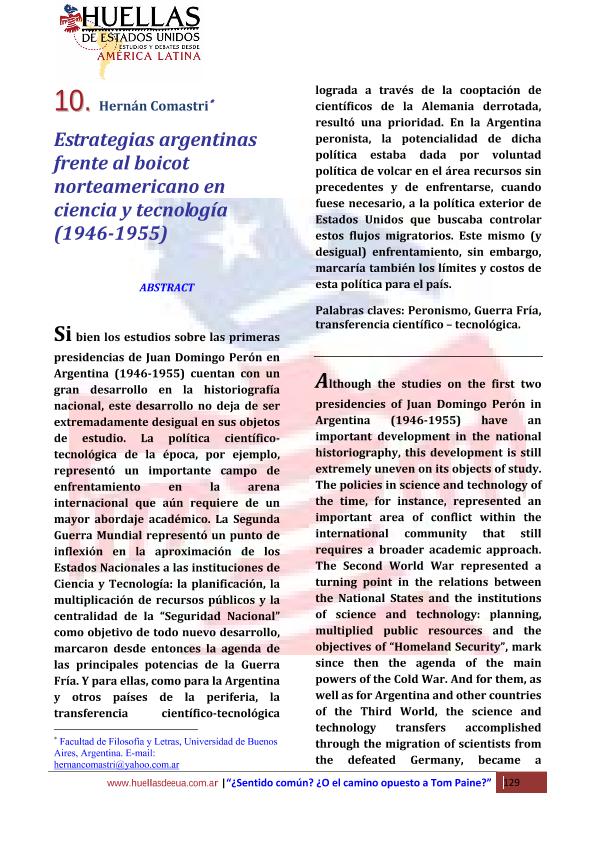Mostrar el registro sencillo del ítem
dc.contributor.author
Comastri, Hernán

dc.date.available
2023-05-12T14:42:42Z
dc.date.issued
2012-09
dc.identifier.citation
Comastri, Hernán; Estrategias argentinas frente al boicot norteamericano en ciencia y tecnología (1946-1955); Universidad de Buenos Aires, Argentina. Facultad de Filosofía y Letras. Cátedra de Historia de los Estados Unidos; Huellas de Estados Unidos; 3; 9-2012; 129-147
dc.identifier.issn
1853-6506
dc.identifier.uri
http://hdl.handle.net/11336/197319
dc.description.abstract
Entre los años 1946 y 1955, el gobierno de Juan Perón en Argentina se enfrentó a un fuerte boicot norteamericano que, entre otras áreas, perjudicó seriamente aquella relacionado con la Ciencia y la Tecnología. En un contexto internacional signado por el fin de la Segunda Guerra Mundial y la posibilidad de acceso a recursos humanos altamente capacitados provenientes de las derrotadas potencias del Eje, el gobierno peronista ensayó diversas respuestas frente a este boicot, que fueron desde la negociación hasta la violación sistemática de los acuerdos hemisféricos impulsados por Estados Unidos para controlar la emigración de nazis y colaboracionistas hacia el continente americano.
dc.description.abstract
Although the studies on the first two presidencies of Juan Domingo Perón in Argentina (19461955) have an important development in the national historiography, this development is still extremely uneven on its objects of study. The policies in science and technology of the time, for instance, represented an important area of conflict within the international community that still requires a broader academic approach. The Second World War represented a turning point in the relations between the National States and the institutions of science and technology: planning, multiplied public resources and the objectives of “Homeland Security”, mark since then the agenda of the main powers of the Cold War. And for them, as well as for Argentina and other countries of the Third World, the science and technology transfers accomplished through the migration of scientists from the defeated Germany, became a priority. In the peronist Argentina, the potential of such a policy was in the political will to invest unprecedented resources in the area, as well as rejecting, whenever necessary, the United States foreign policy set to control these migrations. This (uneven) confrontation, however, would also mark the limits and costs of such a policy for the South American country.
dc.format
application/pdf
dc.language.iso
spa
dc.publisher
Universidad de Buenos Aires, Argentina. Facultad de Filosofía y Letras. Cátedra de Historia de los Estados Unidos
dc.rights
info:eu-repo/semantics/openAccess
dc.rights.uri
https://creativecommons.org/licenses/by-nc-sa/2.5/ar/
dc.subject
Ciencia
dc.subject
Tecnología
dc.subject
Peronismo
dc.subject
Estados Unidos
dc.subject.classification
Historia

dc.subject.classification
Historia y Arqueología

dc.subject.classification
HUMANIDADES

dc.title
Estrategias argentinas frente al boicot norteamericano en ciencia y tecnología (1946-1955)
dc.type
info:eu-repo/semantics/article
dc.type
info:ar-repo/semantics/artículo
dc.type
info:eu-repo/semantics/publishedVersion
dc.date.updated
2023-05-12T11:17:01Z
dc.journal.number
3
dc.journal.pagination
129-147
dc.journal.pais
Argentina

dc.journal.ciudad
Ciudad Autónoma de Buenos Aires
dc.description.fil
Fil: Comastri, Hernán. Consejo Nacional de Investigaciones Científicas y Técnicas; Argentina. Universidad de Buenos Aires. Facultad de Filosofía y Letras. Instituto de Historia Argentina y Americana; Argentina
dc.journal.title
Huellas de Estados Unidos
dc.relation.alternativeid
info:eu-repo/semantics/altIdentifier/url/http://www.huellasdeeua.com/ediciones/edicion3/10_Comastri_p.129-147.pdf
Archivos asociados
